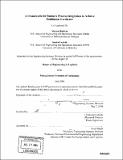A framework for business process integration to achieve fulfillment excellence
Author(s)
Buelvas, Marcos, 1976-; Lontoh, Sonita, 1975-
DownloadFull printable version (6.820Mb)
Other Contributors
Massachusetts Institute of Technology. Engineering Systems Division.
Advisor
Lawrence Lapide.
Terms of use
Metadata
Show full item recordAbstract
Process integration has become more and more important in today's world where companies' supply chains have become more complex. Companies around the world are beginning to realize the importance of integrating their supply chain business processes to achieve fulfillment excellence. Unfortunately, process integration is still somewhat a novel concept and relatively little research has been conducted in examining how companies can effectively implement successful process integration across their supply chains. To complicate matters further, many companies still confuse the concept of business process integration with that of mere data integration. The primary motivation for this research study is to provide a framework on how best to implement process integration to achieve fulfillment excellence. The methodology employed in this particular study comprises the use of two case studies with real-life companies, which provide real-world examples of how companies try to "integrate" their complex supply chain processes. A deep and thorough analysis is then conducted to identify the challenges presented by the firm's current practices from a business process integration perspective. Further analysis then provides an overall view of what is done right and what could have been improved. Last but not least, a generalized framework of best practices and a prescription of how best to implement successful process integration to achieve fulfillment excellence are presented.
Description
Thesis (M. Eng. in Logistics)--Massachusetts Institute of Technology, Engineering Systems Division, 2004. "June 2004." Includes bibliographical references (leaves 71-72).
Date issued
2004Department
Massachusetts Institute of Technology. Engineering Systems DivisionPublisher
Massachusetts Institute of Technology
Keywords
Engineering Systems Division.